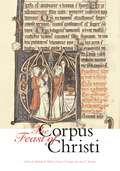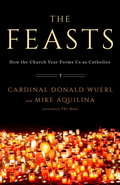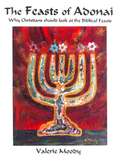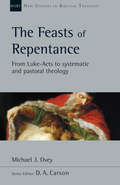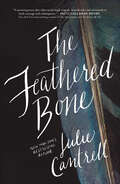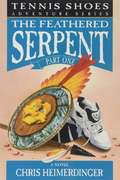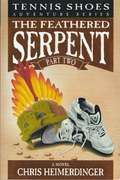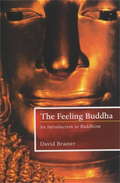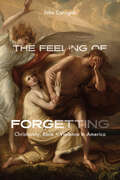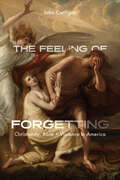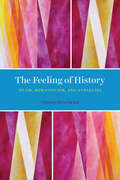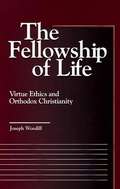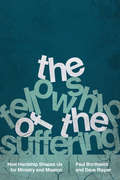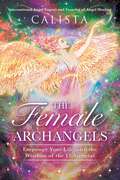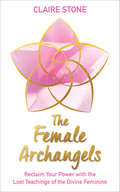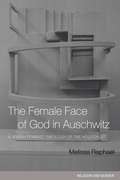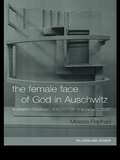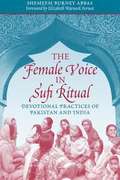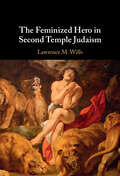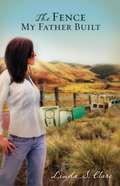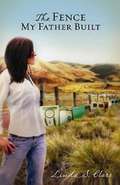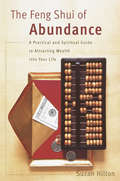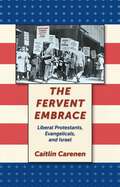- Table View
- List View
The Feast of Corpus Christi
by Barbara R. Walters Vincent Corrigan Peter T. RickettsThe feast of Corpus Christi, one of the most solemn feasts of the Latin Church, can be traced to the Fourth Lateran Council in 1215 and its resolution of disputes over the nature of the Eucharist. The feast was first celebrated in Liège in 1246, thanks largely to the efforts of a religious woman, Juliana of Mont Cornillon, who not only popularized the feast, but also wrote key elements of an original office.This volume presents for the first time a complete set of source materials germane to the study of the feast of Corpus Christi. In addition to the multiple versions of the original Latin liturgy, a set of poems in Old French, and their English translations, the book includes complete transcriptions of the music associated with the feast. An introductory essay lays out the historical context for understanding the initiation and reception of the feast.
The Feasts
by Mike Aquilina Cardinal Donald WuerlEvery day is a holiday in the Catholic Church. In their latest collaboration, Cardinal Wuerl and Mike Aquilina examine the history and traditions behind both favorite and forgotten holidays, from Christmas to Easter, from the Solemnity of the Most Holy Trinity to the Feast of the Holy AngelsCatholic faith is festive, and the Catholic faithful count their days by celebrating the mysteries of Jesus' life. There is a message to be found in the passing of days, weeks, and seasons. Through the feasts, ordinary Christians learn the life of Christ, share it, and come to imitate it. This book continues the work the authors began in their books The Mass and The Church, exploring the meaning and purpose of the most basic and beloved aspects of Catholic life. Each chapter uncovers the biblical origins and development of one of the great feasts or fasts -- Advent, Epiphany, the Holy Angels, all the Marian feasts, and even this very day. The calendar can be a catechism for Catholics who know how to live it."The feasts form us," write the authors, "They help to make us and remake us according to the pattern of the life of Jesus Christ. We number our days as we walk in his footsteps, from his birth to his baptism, from his passion to his resurrection, from his Ascension to his sending of the Spirit to make us saints. We do this faithfully every year, and it defines us as who we are." "Cardinal Wuerl and Aquilina show us the transformative spiritual power in the Church's original and most ancient feasts. This is a book to be prayed with and meditated on. Because when we understand the meaning of the Church's liturgical feasts, we know better the great dignity and destiny we have as children of God." - Most Reverend José Gomez, Archbishop of Los Angeles
The Feasts of Adonai: Why Christians Should Look at the Biblical Feasts
by Valerie MoodyThis book is comprehensive, yet easy to understand. It is complete with a Glossary and Bibliography. Charts include a brief history of the Temple, Eastern Gate in Prophecy, Elements of Fasting, Feast Calendar, Feast Days in the Old and New Testaments, Four Judgment Days, Gematria, Hallel, Hebrew Culture vs. Greek Culture, Hebrew names for days of the week, How to pray for Israel, Jewish Calendar explained, complete list of Hametz, Megillah explained, Sabbath, New Moon, Messianic Passover Seder, Messianic Significance of the Feasts, Mezuzah, Mikvah, Seven Species of Israel, Tefillin, Thirteen Merciful Attributes of God, Tikkun Olam, Torah Reading Schedule and guideline, recipes and menus for every festival.
The Feasts of Repentance: From Luke-Acts to Systematic and Pastoral Theology (New Studies in Biblical Theology #Volume 49)
by Michael J. OveyIn gospel proclamation today, the critical New Testament element of repentance can be far too often ignored, minimalized, or dismissed. Yet John the Baptist, Jesus himself, and those he commissioned to spread his gospel all spoke of the urgent need to repent. Michael Ovey was convinced that a gospel without repentance quickly distorts our view of God, ourselves, and each other by undermining grace and ultimately leading to idolatry. Only when we grasp the need for true repentance as consisting of a real change—a transforming work of the Spirit of God—can we fully understand the gospel Jesus preached. In this New Studies in Biblical Theology volume, Ovey focuses first on the relevant biblical material in Luke–Acts, examining who repents and who does not, and the characters of both groups. He surveys the "feasts of repentance" of Jesus with Levi, the Pharisees, Zaccheus, and in the parable of the Lost Son. He then moves to more systematic-theological aspects of repentance, in relation to idolatry and to salvation, and finally he offers a pastoral theology for the corporate life of the people of God today, with regard to self-righteousness, hypocrisy, humility, forgiveness, and justice. Addressing key issues in biblical theology, the works comprising New Studies in Biblical Theology are creative attempts to help Christians better understand their Bibles. The NSBT series is edited by D. A. Carson, aiming to simultaneously instruct and to edify, to interact with current scholarship and to point the way ahead.
The Feathered Bone
by Julie Cantrell&“Feathers—no matter what size or shape or color—are all the same, if you think about them. They&’re soft. Delicate. But the secret thing about feathers is . . . they are very strong.&” In the pre-Katrina glow of New Orleans, Amanda Salassi is anxious about chaperoning her daughter&’s sixth-grade field trip to the Big Easy during Halloween. And then her worst fears come true. Her daughter&’s best friend, Sarah, disappears amid the magic and revelry—gone, without a trace.Unable to cope with her guilt, Amanda&’s daughter sinks into depression. And Amanda&’s husband turns destructive as he watches his family succumb to grief. Before long, Amanda&’s whole world has collapsed.Amanda knows she has to save herself before it&’s too late. As she continues to search for Sarah, she embarks on a personal journey, seeking hope and purpose in the wake of so much tragedy and loss.Set amidst the murky parishes of rural Louisiana and told through the eyes of two women who confront the darkest corners of humanity with quiet and unbreakable faith, The Feathered Bone is Julie Cantrell&’s master portrait of love in a fallen world.
The Feathered Serpent Part 1 (Tennis Shoes Adventures #3)
by Chris HeimerdingerTransport yourself back in time for another adventure in the ongoing saga that began with Tennis Shoes Among the Nephites and Gadiantons and the Silver Sword. Join Jim Hawkins as he embarks upon his most difficult and perilous quest -- a quest for survival against unseen enemies. A quest to solve the deepening mystery of the disappearance of his sister, Jennifer, and his old friend Garth Plimpton. Jim, now the father of two teenage daughters and a ten-year-old son -- as all stubborn and self-willed as he ever was! -- must battle the forces of an old and secret adversary set on destroying his very existence. Once again Jim must descend through the mysterious passages of Frost Cave and the Rainbow Room, only to emerge with his family in a land and time teetering on the brink of ultimate destruction. The time just prior to the Savior's appearance in the new world.
The Feathered Serpent Part 2 (Tennis Shoes Adventures #4)
by Chris HeimerdingerThe Journey "As we separated from the rest of the refugees of Zarahemla, a terrible vision haunted my thought. By abandoning my two younger children to search for Melody, might I lose my entire family?" The Destruction ""It was coming from the north, a wall of rolling, tumbling, churning clouds the color of charcoal, the sweeping palm of God." The Glory "The man's eyes moved across the gathering at Bountiful's Temple. They were the bluest I have ever seen, and as clear and bright as the limitless universe." Join Jim Hawkins and family as they stand face-to face with the ultimate forces of good and evil in this, the forth volume of the best-selling Tennis Shoes Adventure Series. Hearts will pound and adrenaline will rush as this spectacular Book of Mormon epic races to it's breathtaking climax. The Destruction See also Tennis Shoes Among the Nephites, Gadiantons and the Silver Sword, Feathered Serpent, Part 1, Sacred Quest, Lost Scroll, Golden Crown, Warriors of Cumorah, Tower of Thunder, and Kingdoms and Conquerors.
The Feeling Buddha: An Introduction to Buddhism
by David BrazierThis account explains how the Buddha's path of wisdom and loving kindness grew out of the challenges he encountered in life. It explores enlightenment, nirvana, and the Four Noble Truths, presenting a picture of the Buddha as a very human figure whose success lay not in his perfection, but in his method of positively utilizing the energy generated by personal suffering.
The Feeling Buddha: An Introduction to Buddhism
by David BrazierThis account explains how the Buddha's path of wisdom and loving kindness grew out of the challenges he encountered in life. It explores enlightenment, nirvana, and the Four Noble Truths, presenting a picture of the Buddha as a very human figure whose success lay not in his perfection, but in his method of positively utilizing the energy generated by personal suffering.
The Feeling of Forgetting: Christianity, Race + Violence in America
by John CorriganA provocative examination of how religious practices of forgetting drive white Christian nationalism. The dual traumas of colonialism and slavery are still felt by Native Americans and African Americans as victims of ongoing violence toward people of color today. In The Feeling of Forgetting, John Corrigan calls attention to the trauma experienced by white Americans as perpetrators of this violence. By tracing memory’s role in American Christianity, Corrigan shows how contemporary white Christian nationalism is motivated by a widespread effort to forget the role race plays in American society. White trauma, Corrigan argues, courses through American culture like an underground river that sometimes bursts forth into brutality, terrorism, and insurrection. Tracing the river to its source is a necessary first step toward healing.
The Feeling of Forgetting: Christianity, Race, and Violence in America
by John CorriganA provocative examination of how religious practices of forgetting drive white Christian nationalism. The dual traumas of colonialism and slavery are still felt by Native Americans and African Americans as victims of ongoing violence toward people of color today. In The Feeling of Forgetting, John Corrigan calls attention to the trauma experienced by white Americans as perpetrators of this violence. By tracing memory’s role in American Christianity, Corrigan shows how contemporary white Christian nationalism is motivated by a widespread effort to forget the role race plays in American society. White trauma, Corrigan argues, courses through American culture like an underground river that sometimes bursts forth into brutality, terrorism, and insurrection. Tracing the river to its source is a necessary first step toward healing.
The Feeling of History: Islam, Romanticism, and Andalusia
by Charles HirschkindIn today’s world, the lines between Europe and the Middle East, between Christian Europeans and Muslim immigrants in their midst, seem to be hardening. Alarmist editorials compare the arrival of Muslim refugees with the “Muslim conquest of 711,” warning that Europe will be called on to defend its borders. Violence and paranoia are alive and well in Fortress Europe. Against this xenophobic tendency, The Feeling of History examines the idea of Andalucismo—a modern tradition founded on the principle that contemporary Andalusia is connected in vitally important ways with medieval Islamic Iberia. Charles Hirschkind explores the works and lives of writers, thinkers, poets, artists, and activists, and he shows how, taken together, they constitute an Andalusian sensorium. Hirschkind also carefully traces the various itineraries of Andalucismo, from colonial and anticolonial efforts to contemporary movements supporting immigrant rights. The Feeling of History offers a nuanced view into the way people experience their own past, while also bearing witness to a philosophy of engaging the Middle East that experiments with alternative futures.
The Fellowship Of Life: Virtue Ethics And Orthodox Christianity
by Joseph Woodill James F. KeenanBringing Orthodox Christianity into the recent dialog on virtue ethics, Joseph Woodill investigates the correspondences between the Eastern Orthodox tradition and contemporary virtue ethics, and he develops a distinctly Orthodox vision of theological ethics. This book fills a vacuum in our understanding of the Eastern Church by revealing themes, persons, and insights that offer resources for a contemporary moral theology. Reviewing the Eastern tradition from patristic times to the present, Woodill shows its relevance to contemporary virtue ethics and identifies both differences and similarities between Orthodox and other -- Catholic, Protestant, and Jewish -- virtue ethics.
The Fellowship of the Mystery
by John Neville FiggisThis work has been selected by scholars as being culturally important, and is part of the knowledge base of civilization as we know it. <p><p>This work was reproduced from the original artifact, and remains as true to the original work as possible. Therefore, you will see the original copyright references, library stamps (as most of these works have been housed in our most important libraries around the world), and other notations in the work.
The Fellowship of the Suffering: How Hardship Shapes Us for Ministry and Mission
by Paul Borthwick Dave RipperMissionary Paul Borthwick and pastor Dave Ripper show how transformation through our personal pain enables us to minister faithfully to a hurting world. They candidly share about their own struggles and how they have seen God's kingdom advance through hardship and suffering. We can become powerful witnesses to Christ as a result of our brokenness.
The Female Archangels: Empower Your Life with the Wisdom of the 17 Archeiai
by CalistaEmbody the Divine Feminine wisdom and consciousness of the Heavenly Archeiai• Introduces 17 female Archangels and how to partner with them to evolve your life and your spiritual path of Ascension• Shares wisdom and practical techniques to harness your Angelic power and create your version of Heaven on Earth• Includes Angelic attunements, rituals, and journeys to help you embody the Divine Feminine as well as full-color illustrations embedded with Angelic energy and light codes for attuning to the frequencies of the ArcheiaiNow is the time for the Archeiai, the female twin flames to the Archangels, to emerge more fully into our awareness. Exploring the enigma of these Angelic beings and the gifts they bring, Angel healing pioneer Calista introduces 17 of the most purposeful Archeiai—each named to symbolize the quality she represents, such as Grace, Clarity, or Joy. With their all-encompassing presence, the Archeiai can help you discover your potential and realize the origin of your fears and insecurities, allowing you to heal at the root. With potent Light codes and vibrations embedded in their images, these feminine luminaries invite you to attune to their frequencies so you can embody them to enrich your life and path of spiritual Ascension.For each of the 17 Archeiai, Calista shares their direct loving guidance, virtuous qualities, crystal and plant associations, and ways to work with their alchemical rays. Rituals, practices, and attunements are then included to support you to step fully into your own Angelic consciousness. Let yourself be healed and empowered as your dreams manifest, your vibration expands, and your heart fills with Love.
The Female Archangels: Reclaim Your Power with the Lost Teachings of the Divine Feminine
by Claire StoneWhy are we only taught about male Archangels, and why has no one ever questioned this phenomenon?Claire Stone has communicated directly with angels since she was a child and therefore knows that the Archeiai, the female archangels, are really twin flames to the male archangels. The collective suppression of the divine feminine has led humanity to believe that there were no female angels of any kind, but as we start to re-awaken to the wisdom of the Mother Goddess, the veils are lifted, allowing us to reclaim our lost spiritual heritage.Claire explains how to work with the 11 Archeiai on a deeper level using affirmations, invocations and rituals. For each situation in life, there is an Archeia you can call upon - e.g., when you wish to manifest a romantic relationship, invoke Charity to guide you on the path of love. The exercises within will help you develop your psychic abilities, discover your life's purpose, connect with heaven and earth, clear your womb space from past sexual partners, banish negative energy, create a love altar and much more.This book does not replace the male archangels, but rather complements them, maintaining a healthy balance between masculine and feminine. The Archeiai are emerging right now and reaching out to all beings on earth to empower, comfort and support us through our earthly journey.
The Female Face of God in Auschwitz: A Jewish Feminist Theology of the Holocaust (Religion and Gender)
by Melissa RaphaelThe Female Face of God in Auschwitz, the first full-length feminist theology of the Holocaust, argues that the patriarchal bias of post-Holocaust theology becomes fully apparent only when women's experiences and priorities are brought into historical light.
The Female Face of God in Auschwitz: A Jewish Feminist Theology of the Holocaust (Religion and Gender)
by Melissa RaphaelThe dominant theme of post-Holocaust Jewish theology has been that of the temporary hiddenness of God, interpreted either as a divine mystery or, more commonly, as God's deferral to human freedom. But traditional Judaic obligations of female presence, together with the traditional image of the Shekhinah as a figure of God's 'femaleness' accompanying Israel into exile, seem to contradict such theologies of absence. The Female Face of God in Auschwitz, the first full-length feminist theology of the Holocaust, argues that the patriarchal bias of post-Holocaust theology becomes fully apparent only when women's experiences and priorities are brought into historical light. Building upon the published testimonies of four women imprisoned at Auschwitz-Birkenau - Olga Lengyel, Lucie Adelsberger, Bertha Ferderber-Salz and Sara Nomberg-Przytyk - it considers women's distinct experiences of the holy in relation to God's perceived presence and absence in the camps. God's face, says Melissa Raphael, was not hidden in Auschwitz, but intimately revealed in the female face turned towards the other as a refractive image of God, especially in the moral protest made visible through material and spiritual care for the assaulted other.
The Female Voice in Sufi Ritual: Devotional Practices of Pakistan and India
by Abbas Shemeem BurneyThe female voice plays a more central role in Sufi ritual, especially in the singing of devotional poetry, than in almost any other area of Muslim culture. This research clarifies why the female voice is so important in Sufi practice and underscores the many contributions of women to Sufism and its rituals.
The Feminized Hero in Second Temple Judaism
by Lawrence M. WillsThe turbulent Second Temple period produced searching biblical texts whose protagonists, unlike heroes like Noah, Abraham, and Moses, were more everyday figures who expressed their moral uncertainties more vocally. Reflecting on a new type of Jewish moral agent, these tales depict men who are feminized, and women who are masculinized. In this volume, Lawrence M. Wills offers a deep interrogation of these stories, uncovering the psychological aspects of Jewish identity, moral life, and decisions that they explore. Often written as novellas, the stories investigate emotions, psychological interiorizing, the self, agency, and character. Recent insights from gender and postcolonial theory inform Wills' study, as he shows how one can study and compare modern and ancient gender constructs. Wills also reconstructs the social fabric of the Second Temple period and demonstrates how a focus on emotions, the self, and moral psychology, often associated with both ancient Greek and modern literature, are present in biblical texts, albeit in a subtle, unassuming manner.
The Fence My Far Built
by Linda S. ClareIn The Fence My Father Built when legally separated Muri Pond, a librarian, hauls her kids, teenage Nova and eleven year-old Truman, out to the tiny town of Murkee, Oregon, where her father, Joe Pond lived and died, she's confronted by a neighbor's harassment over water rights and Joe's legacy: a fence made from old oven doors. The fence and accompanying house trailer horrify rebellious Nova, who runs away to the drug-infested streets of Seattle. Muri searches for her daughter and for something to believe in, all the while trying to save her inheritance from the conniving neighbor who calls her dad Chief Joseph. Along with Joe's sister, Aunt Lutie, and the Red Rock Tabernacle Ladies, Muri must rediscover the faith her alcoholic dad never abandoned in order to reclaim her own spiritual path.
The Fence My Father Built
by Linda S. ClareIn The Fence My Father Built, when legally separated Muri Pond, a librarian, hauls her kids, teenage Nova and eleven year-old Truman, out to the tiny town of Murkee, Oregon, where her father, Joe Pond lived and died, she's confronted by a neighbor's harassment over water rights and Joe's legacy: a fence made from old oven doors. The fence and accompanying house trailer horrify rebellious Nova, who runs away to the drug-infested streets of Seattle. Muri searches for her daughter and for something to believe in, all the while trying to save her inheritance from the conniving neighbor who calls her dad Chief Joseph. Along with Joe's sister, Aunt Lutie, and the Red Rock Tabernacle Ladies, Muri must rediscover the faith her alcoholic dad never abandoned in order to reclaim her own spiritual path.
The Feng Shui of Abundance: A Practical and Spiritual Guide to Attracting Wealth into Your Life
by Suzan HiltonMoney is more than a bank balance; it's a reflection of the overall abundance in your life. Now, a CPA and feng shui practitioner presents an unusual and valuable application of the ancient Eastern tradition of feng shui. Delving into all of the life forces that affect financial health, The Feng Shui of Abundance is not just a monetary makeover; it is a whole-being program whose benefits include: ·Locating the wealth area of your office or home ·Dislodging clogged energy in your career ·Drawing on the ...
The Fervent Embrace: Liberal Protestants, Evangelicals, and Israel
by Caitlin CarenenWhen Israel declared its independence in 1948, Harry Truman issued a memo recognizing the Israeli government within eleven minutes. Today, the U.S. and Israel continue on as partners in an at times controversial alliance—an alliance, many argue, that is powerfully influenced by the Christian Right. In The Fervent Embrace, Caitlin Carenen chronicles the American Christian relationship with Israel, tracing first mainline Protestant and then evangelical support for Zionism.In the aftermath of the Holocaust, American liberal Protestants argued that America had a moral humanitarian duty to support Israel. Christian anti-Semitism had helped bring about the Holocaust, they declared, and so Christians must help make amends. Moreover, a stable and democratic Israel would no doubt make the Middle East a safer place for future American interests. Carenen argues that it was this mainline Protestant position that laid the foundation for the current evangelical Protestant support for Israel, which is based primarily on theological grounds.Drawing on previously unexplored archival material from the Central Zionist Archives in Israel, this volume tells the full story of the American Christian-Israel relationship, bringing the various “players”—American liberal Protestants, American Evangelicals, American Jews, and Israelis—together into one historical narrative.
